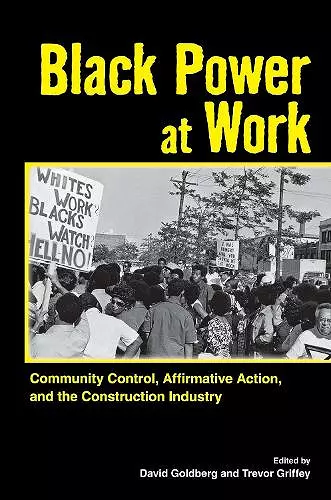Black Power at Work
Community Control, Affirmative Action, and the Construction Industry
David Goldberg editor Trevor Griffey editor
Format:Hardback
Publisher:Cornell University Press
Published:26th Aug '10
Currently unavailable, and unfortunately no date known when it will be back

Black Power at Work chronicles the history of direct action campaigns to open up the construction industry to black workers in the 1960s and 1970s. The book's case studies of local movements in Brooklyn, Newark, the Bay Area, Detroit, Chicago, and Seattle show how struggles against racism in the construction industry shaped the emergence of Black Power politics outside the U.S. South. In the process, "community control" of the construction industry—especially government War on Poverty and post-rebellion urban reconstruction projects— became central to community organizing for black economic self-determination and political autonomy.
The history of Black Power's community organizing tradition shines a light on more recent debates about job training and placement for unemployed, underemployed, and underrepresented workers. Politicians responded to Black Power protests at federal construction projects by creating modern affirmative action and minority set-aside programs in the late 1960s and early 1970s, but these programs relied on "voluntary" compliance by contractors and unions, government enforcement was inadequate, and they were not connected to jobs programs. Forty years later, the struggle to have construction jobs serve as a pathway out of poverty for inner city residents remains an unfinished part of the struggle for racial justice and labor union reform in the United States.
Black Power at Work is an invaluable resource. Through the articles assembled by the two editors, the reader is introduced to an entirely different side of both the Black Freedom Movement and organized labor.... It is a powerful examination of a social movement that has often been overlooked due to a class bias on the part of many commentators. The leaders and members of these militant organizations were, by and large, not from the middle stratum; they were not doctors, lawyers and ministers, but instead rank and file worker activists.
-- Bill FletcherJr. * ILR Review *Initially many readers might think this focus on construction jobs to be narrow, even parochial, but instead the book's contributors demonstrate how in just this one area Black Power proves far more complex and varied than traditional historiography, never mind the popular perception, has understood.
* H-NISBN: 9780801446580
Dimensions: 235mm x 155mm x 24mm
Weight: 907g
280 pages